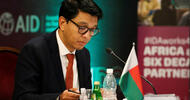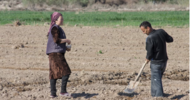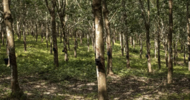Anywaa Survival Organisation (ASO) recently had an opportunity to interview affected community representatives and leaders who fled their homes in Gambela and Lower Omo because of government land grabs.
- InterContinental Cry
-
17 October 2013
Two new reports from the Oakland Institute show how Western development assistance is supporting forced evictions and massive violations of human rights in Ethiopia.
- Oakland Institute
-
17 July 2013
Background note to accompany a joint press release on the Kenyan government finding Karuturi Global Ltd guilty of tax evasion
A controversial resettlement program in Ethiopia is the latest battleground in the global race to secure prized farmland and water. Correspondent Cassandra Herrman reports as part of the Food for 9 Billion series, a NewsHour partnership with the Center for Investigative Reporting, Homelands Productions and Marketplace.
Many of the areas from which people are being moved are slated for leasing by the Ethiopian government for commercial agricultural development, according to a new report from Human Rights Watch.
Rebuttal from Ethiopia's ambassador to Japan against the article "Japan, please don't go grabbing Ethiopians' land," insisting that the government is only leasing out "unutilized land and some other land holdings by government-owned enterprises".
- Japan Times
-
11 April 2010
How could Meles know the legitimate owners of the land, namely the future generation of Ethiopians, may not need the land say 20 years from now?
- Anyuak Media
-
26 January 2010
Ethiopia's potential can be maximized only if we Ethiopians are the producers and sellers of our own agricultural products. What Meles Zenawi is doing now is putting this upside down. He made our potential buyers the sellers of our commodity.
- Ethiomedia
-
03 December 2009
In June 2009, the Indian company Karuturi took up intensive farming in Ethiopia. The harvest will be exported to Asia and Europe.
- L'Hebdo
-
03 September 2009
Too few investors knew the land; too many deals were crooked. Yet officials hint that the government wants to promote huge farms once more, this time by expanding wheat production to boost food security.
As the economy thrives, filmmakers Veronique Mauduy and Romain Pelleray examine the plight of Ethiopians forced from their land to make way for foreign investors.
- Al Jazeera
-
29 January 2014
A Saudi agricultural investor warns about the failure of Saudi agricultural investments in Ethiopia and the liquidation of businesses due to the conditions set by the Saudi Agricultural Development Fund
- Al-monitor
-
09 December 2013
Government plans to reform Ethiopia’s agriculture failed to consider the country’s peasant culture, subsistence farming and basic needs, letting the corporations take the most fertile land from peasant farmers.
- Le Monde diplomatique
-
05 December 2013
When the Ethiopian government completes the Gibe III dam on the upper Omo, as it is expected to do shortly, large-scale irrigation will follow, allowing government sugar plantations to gobble up huge swathes of their ancestral land.
- Africa Review
-
17 April 2013
Bank's accountability panel says complaints by Ethiopians of forced evictions in Gambella should be looked into.
With the coming of big industrial farms in Ethiopia, local people, villagers and pastoralists are being threatened, intimidated, forcibly displaced and herded into camps by the military, their homes destroyed.
- Redress Information & Analysis
-
01 Mar 2013
Mercy Corps, a non-governmental aid agency, plans to set up a $10 million private equity fund in Ethiopia to encourage foreign investment, primarily in agriculture.
- Bloomberg
-
11 December 2012
Ethiopia has forced at least 70,000 people off their land so it can lease fertile fields to foreign investors, a move that has left some locals starving in barren, remote villages.
- Toronto Star
-
18 January 2012
Rich soil, a tropical climate, and an abundance of water: the region of Gambela in the west of the country is fertile. Foreign investors are renting thousands of hectares of it to develop intensive agriculture without regard for the environment and the population, reports Le Monde.
Ethiopia slashed the size of Karuturi’s land concession that was larger than Luxembourg on concern it was too big for a single company to manage and to enable an annual migration of antelope, the government said.
Foreign investments help Ethiopia to develop, and provide knowledge, skills and taxes, says Ethiopia's Ambassador to the UK.
Like Karuturi’s disappeared $100 million farm investment, the Addis Ababa expansion plan embodies the perils and contradictions of the Ethiopian regime’s strategy of securing internal calm through economic growth and strong ties with foreign powers.
- Business Insider
-
19 January 2016
In order to meet the increasing flow of investment in the horticulture sector, the government has identified five corridors consisting of 50,000 hectares of land.
In Gambella, enormous areas of fertile land are lying fallow at an unfinished huge agricultural project site, and agricultural machines stand idle in rows, sinking into the ground.
In Ethiopia, where pastoralists and indigenous communities are displaced and evicted from their traditional lands amidst widespread human rights abuses, history is repeating itself.
In the face of evidence, the UK and US continue to deny systematic human rights abuses are occurring in the Lower Omo as thousands are displaced for an irrigation scheme.
- Think Africa Press
-
04 November 2013
The takeover of peoples' land and water by corporations – even if they are from the global south – is a new form of colonisation, writes Anuradha Mittal.
- The Guardian
-
25 February 2013
Saudi Star has begun rice cultivation on 10,000ha of land in Gambella and a 10,000ha irrigation project along the already-compromised Alwero River. Only grain that does not meet export requirements will be sold locally.
- Green Prophet
-
24 January 2012
“There is no villagization programme,” Sai Ramakrishna Karuturi, founder of Karuturi Global, told Mint via telephone. “This is a completely jaundiced western vision. They assume anything in Africa has to be done by the whites and the Chinese and Indians should have businesses only in their own countries.”
For Gambellans who live as pastoralist and subsistence farmers, massive dispossession and auctioning off their land for pennies will inevitably destroy the very fabric of their society and way of life and threaten them with extinction.















